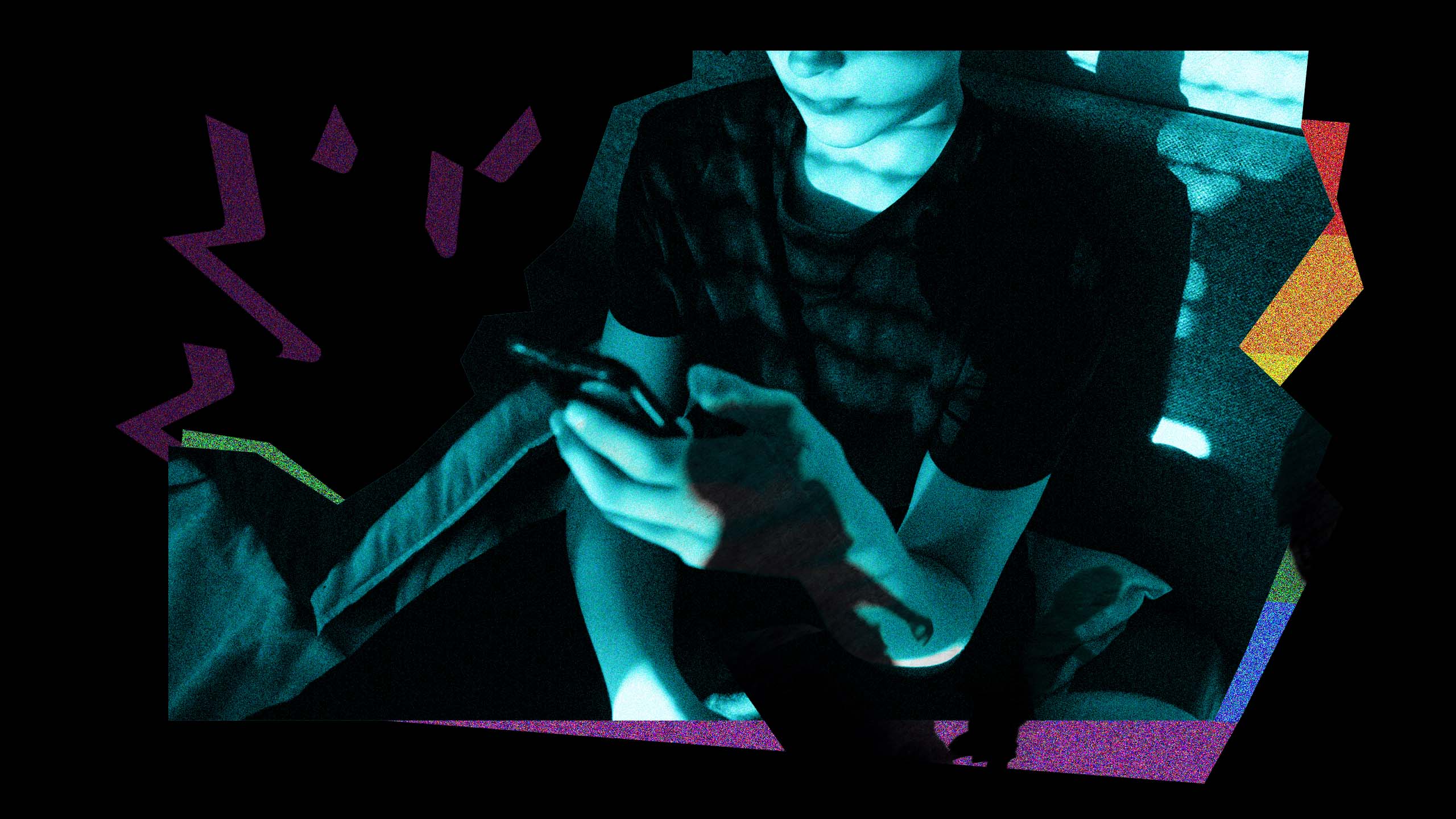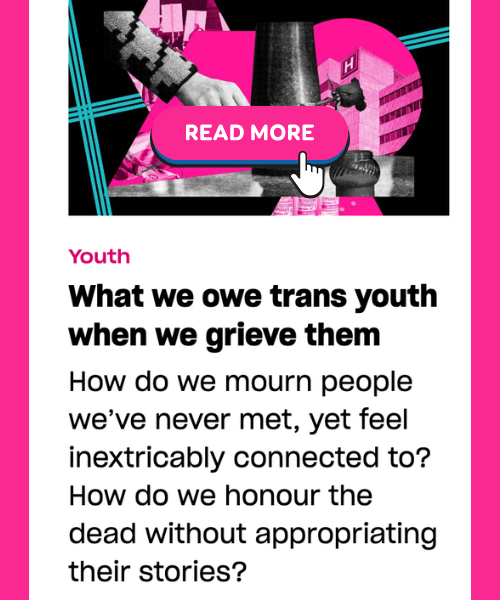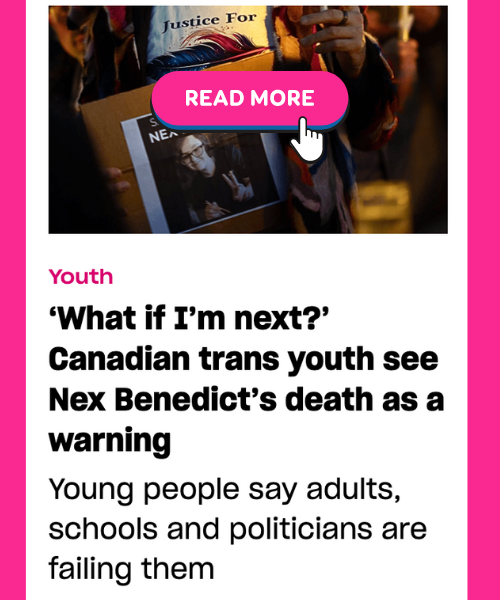Sept. 20 was a hard day for some Edmonton queer and trans youth who watched their classmates leave their high school to join their parents at a protest happening nearby.
Over the lunch hour and into the early afternoon, protestors carried signs and chanted in front of the Alberta Teachers’ Association office—one of multiple events that occurred in cities nationwide as part of the so-called 1 Million March 4 Children.
Demonstration organizers said they were protesting for the repeal of sexual orientation and gender identity (SOGI) curriculum, but those who work closely with youth say many queer and trans students felt like the target.
Unlike past anti-gay protests that have often occurred at Pride events, many 1 Million March demonstrations were in front of schools, says Dr. Barbara Perry, director of the Centre on Hate, Bias and Extremism at the Ontario Tech University. “So, it really feels to them, I’m sure, like a direct attack,” she says.
To reduce the disruptions from the protest taking place just down the road, the staff at the Edmonton high school shifted some students to classrooms away from external windows, says Kelsey Robbins, executive director of Outloud St. Albert, an organization that supports area queer and trans youth. Other young people called their parents, asking to go home, they say.
But while the protests lasted for a few hours, their impact has lingered.
Rural youth who attend Outloud St. Albert’s programs have reported increased bullying and heightened fears of being outed, Robbins says. The organization, too, has seen a rise in harassment. In October, a social media post for a Halloween event garnered over a dozen negative comments, a now common occurrence.
“They tell us we’re groomers and pedophiles,” Robbins says.
Outloud St. Albert isn’t alone. National LGBTQ2S+ organization TransCare+ has also seen an increase in reports of bullying, mental distress and fears of being outed from youth in five provinces since September.
LGBTQ2S+ organizations in the Yukon and Ontario have also faced an uptick in digital and verbal harassment.
“People think [the hate] stopped the second that protest ended, but it definitely did not,” Robbins says.
Protests “emboldened” hate in-person, online
In a P.E.I. support group, staff asked queer, trans and questioning youth how they were feeling following the September protests. Hannah Barton, a youth program coordinator for PEERS Alliance, the charity that runs the group, says the responses were sobering. Barton recalls hearing one young person saying, “I don’t know much, but I know I’m scared.”
In Charlottetown, 1 Million March counter-protestors outnumbered anti-SOGI demonstrators more than two to one, but the protests “emboldened” people to be hateful, Barton says. Even parents who didn’t attend the protest spoke about it and made their positions clear, Barton says. This led some queer and trans youth to feel less comfortable coming out to their parents. It prompted others to mimic their parents’ hateful views in class and online, they say.
At school, the rumour mill gets going quickly if you defend your friend against homophobic bullying, Barton says. The argument turns to, “Oh, you must be gay, too, then,” they say.
Since the demonstrations, PEERS Alliance program coordinators have noticed more youth reporting bullying, in-person and online.
Though bullying affects many young people, a 2019 federal youth survey showed queer and trans youth between the ages of 15 to 18 are most impacted. In the preceding year, 77 percent of LGBTQ2S+ youth surveyed reported being bullied, compared to 69 percent of their cisgender peers. LGBTQ2S+ youth also reported more frequent bullying and experiencing more types of bullying than their cisgender peers.
Research shows these experiences take a toll. Of those LGBTQ2S+ youth who had been bullied, 27 percent had considered suicide—more than double the percentage of their cisgender peers who had been bullied (13 percent) and nearly double the percentage for LGBTQ2S+ peers who had not been bullied (16 percent).
Pronoun policy changes prompt outing fears
In addition to increased reports of bullying, some queer and trans young people are also increasingly fearful of being outed in response to pronoun policy changes in New Brunswick and Saskatchewan, says Jacob Barry, executive director of TransCare+.
In June, New Brunswick updated a policy to newly require teachers to obtain parental consent before using a student’s chosen name and pronouns. In October, Saskatchewan premier Scott Moe passed a law implementing similar rules in provincial classrooms, employing the notwithstanding clause to forestall any constitutional challenge to the changes.
The policy changes and protests have contributed to an increase in requests for support from TransCare+ from LGBTQ2S+ youth and their caregivers in five provinces—New Brunswick, Nova Scotia, Ontario, Alberta and Saskatchewan. (Only in British Columbia and the Yukon have requests for the non-profit’s support remained consistent, Barry says.)
When TransCare+ hosts virtual open space sessions, youth increasingly ask how to navigate coming out and how to create safety plans for at school and home, they say. “Our emails are inundated with requests for support or information.”
In P.E.I., Barton’s experience is similar.
After the New Brunswick policy change was publicized, youth group members asked if they were still safe to use their chosen name at school. Barton wasn’t sure what to tell them, given the changing political climate. “Because P.E.I. is so small, it’s very much like, ‘Oh, if it can happen there, it can happen here, absolutely,’” they say.
Youth organizations face fake calls and harassment
Not all youth organizations have seen a noticeable uptick in requests for support, however.
Last fall, LGBT Youthline, a Toronto-based charity, saw no spike in requests for peer support through their text, chat and phone services following the 1 Million March.
The organization has, however, seen an increase in fake calls to their phone line this fall, says Lauren Pragg, the organization’s interim executive director. During the calls, people pretend to be queer youth in need of support to waste time and harass the volunteers who run the lines, they say.
“It takes a real toll on volunteers who are showing up with their best, humble, vulnerable, generous selves to support another queer or trans young person,” they say, to then have “someone who’s wasting their time and, sort of, making a mockery of what we do.”
In the north, LGBTQ2S+ support organization Queer Yukon has also seen an uptick in negative posts on their social media pages since the 1 Million March protest in Whitehorse.
In St. Albert, hateful social media posts have been accompanied by threatening letters and phone calls, Robbins says, prompting the organization to review their security protocols and to practise evacuation drills with youth.
Organizations launch new initiatives to offer support
To help support young LGBTQ2S+ people, several organizations have launched new initiatives and doubled down on existing programs.
After the Whitehorse protest, Queer Yukon asked community members to sign an open letter to support LGBTQ2S+ youth and SOGI curricula, garnering about 275 signatures. They also launched a new peer support program for parents of queer and trans kids, based on requests from young Yukoners for adults to educate other adults.
In P.E.I., PEERS Alliance hosted a queer joy event in October on the same day a second anti-SOGI protest had been planned. Rather than exposing their community to hate by counter-demonstrating, youth gathered for a dance party and to write about why they love being part of the queer community, Barton says.
In Alberta, non-profit Edmonton 2 Spirit Society has continued to provide support for Indigenous youth to access rites of passage opportunities, such as naming and pipe ceremonies, Cree classes and lessons with Elders, says executive director Cheyenne Mihko Kihêw.
They’ve also helped youth to connect with Pride Corner, an ongoing initiative where youth gather on Friday nights at an intersection in the city’s downtown to dance, sing and counter the homophobic messages of street preachers.
In neighbouring St. Albert, Robbins’s team has launched a new club for Dungeons & Dragons, a role-playing game popular among queer and trans youth. The effort is part of the organization’s goal to counter the rise in hate with even more love and to provide spaces for queer and trans youth to be themselves, Robbins says.
“Sometimes supporting these youth is just giving them a place where they can go and do the things they love safely—because things aren’t safe for them anymore.”




 Why you can trust Xtra
Why you can trust Xtra


